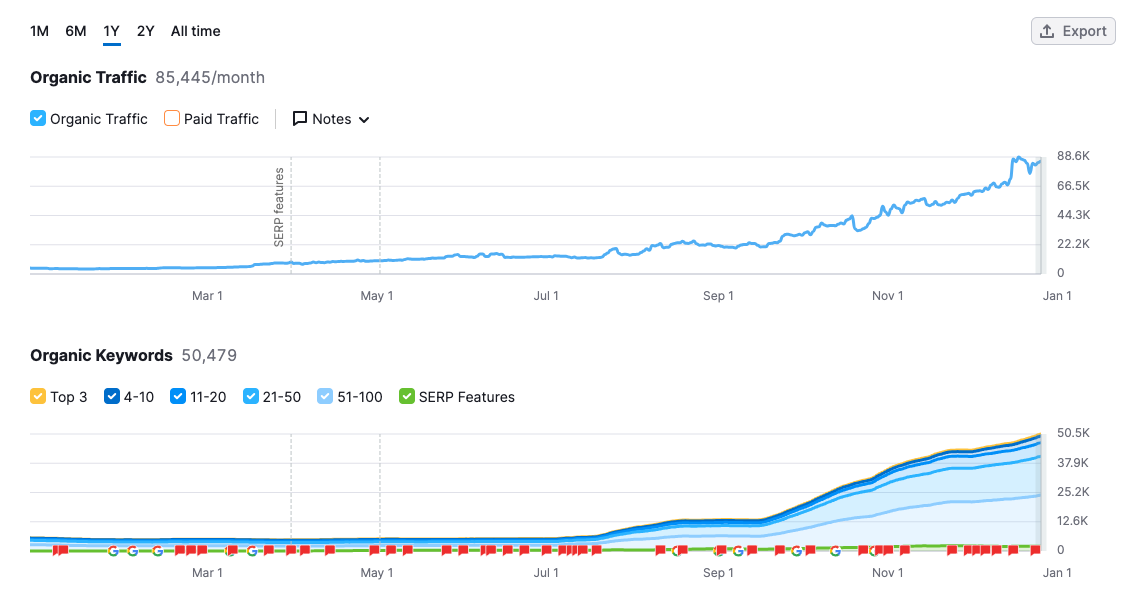Keyword research is a fundamental aspect of search engine optimization (SEO) that helps websites improve their visibility in search results and attract targeted organic traffic. It helps you uncover the search terms and phrases that your potential visitors are using to find information, products, or services online. By understanding how to find the right keywords for your website and strategically incorporating these keywords into your website’s content, you can optimize your online presence and effectively reach your intended audience.
In this blog, we will explore the art of keyword research for SEO and delve into the strategies and tools you can employ to find the right keywords for your website. So, discover the importance and key techniques to find the perfect keywords that align with your website’s goals, attract your ideal audience, and drive sustainable organic traffic.
What is Keyword Research?
Keyword research is the process of identifying the keywords and phrases that people use to search for content online, with the goal of incorporating those keywords into your website’s content and structure to improve its search engine rankings. Finding the right keywords for your website is a critical step in the SEO process, as it helps to ensure that your website appears in relevant search results and attracts the right audience.
Keyword Research for SEO is Important
There are a number of reasons why keyword research is important for SEO. Keyword research can optimize the website content to better match user intent, and improve their search engine ranking. And this will ultimately drive more leads and sales. This will help you to attract more visitors to your website and improve your website’s ranking in SERP.
- Keyword research helps businesses identify the specific words and phrases that their target audience is using to search for relevant content online. By analyzing search data and trends, businesses can gain insights into the latest marketing trends. Besides, they can adjust their marketing strategies accordingly.
- It is also essential for attracting more traffic to a website. By optimizing a website’s content around relevant and important keywords, businesses can improve their search engine ranking. Resulting in more traffic from search engines.
- Keyword research plays a vital role in acquiring new customers. By identifying the specific words and phrases that their target audience is using to search for products and services, businesses can optimize their website’s content to meet their customers’ needs.
Steps to Conduct Keyword Research for SEO
Before diving into keyword research, it’s essential to define your website’s goals. Think about the purpose of your website. Are you looking to generate leads, sell products, or provide informative content? Identifying your goals will help you choose keywords that align with your website’s purpose and target audience.

Start with Listing Important Keywords
To begin, it is important to identify the core topics and themes that your business is centered around. This could include your products, services, or other areas of expertise your business is known for. This is a simple but effective way to stay organized and focused while conducting research.
Key Elements
Successful keyword research involves finding the right balance between relevance, competition, search volume, user intent, and long-tail keywords. We can define key elements of keyword research into several factors like relevancy, competition, search volume, user intent, and considering long-tail keywords.
- Relevance and Competition
Once you have identified these core topics and made a list of potential keywords, choose keywords that are relevant and have a reasonable level of competition to improve your chances of ranking for them. You can also use google search team to get more relevant keywords that people search for.
- Search Volume
You should also consider the search volume for each keyword. This will give you an idea of how many people are searching for that term and how competitive it is. You may want to focus on keywords with high search volume. But be aware that these may also be highly competitive. Finding high-volume, low-competitive keywords are the most useful to your business and your target audience.
- User Intent
Consider the user intent behind each keyword. What is the user trying to find or accomplish when they search for that term? Keywords that reflect user intent can help attract the right audience and improve the user experience on your website.
Keyword Patterns
Two specific patterns of keywords that are often considered in keyword research are long tail keywords and question keywords.
- Long-Tail Keywords
Long tail keywords are longer and more specific keyword phrases that typically consist of three or more words. Unlike shorter, more generic keywords, long-tail keywords target a narrower audience and tend to have lower search volumes. However, they can be highly valuable because they often indicate a more specific search intent and higher conversion potential.
- Question Keywords
Question keywords are search queries that explicitly pose a question. With the rise of voice search and the increased use of digital assistants, question keywords have become more prevalent. Optimizing your content for question keywords can help you capture traffic from users who are seeking direct answers. Query structure and User Intent are important considerations for question keywords.
Using Keyword Research Tools
There are several tools available that can help you generate keyword ideas and estimate search volume. Some effective keyword research tools to use include Google Ads Keyword Planner, SEMrush, and Moz. These tools allow you to search for keywords, analyze their volume and competition, and gain insights into the keywords that your competitors are targeting. Here are some more online tools to research keywords.
- Ahref
- Keyword Surfer
- Keywords Everywhere
- Mangools KW Finder
- Ubersuggest
Using Google Trends
Google Trends is a valuable tool for keyword research as it provides insights into search trends, allows you to compare keywords, discover related queries, and refine your keyword selection. By utilizing Google Trends alongside other keyword research tools, you can make data-driven decisions to optimize your website for the right keywords and stay ahead of the competition.
Here are a few ways Google Trends can help:
- Identifying search trends over time.
- Comparing the popularity of multiple keywords.
- Expanding your keyword list with related queries and trending topics.
- Providing geographical insights for local SEO.
- Validating keyword ideas based on search volume trends.
- Assisting in content planning by highlighting popular or timely subjects.
Analyze Your Competitors
Keyword research competitor analysis is a process that involves examining the keywords your competitors are targeting and ranking for in search engine results. By understanding the keywords your competitors are using, you can gain insights into their SEO strategies, identify potential opportunities, and make informed decisions to improve your own keyword targeting.
To analyze competitors for keyword research, businesses also can identify their main competitors in the industry. You use keyword research tools to analyze the keywords that their competitors are using in their website content, meta tags, and other online assets.
Leverage AI Tools
AI tools like ChatGPT or Google BARD can help businesses identify the most relevant and important keywords for their target audience, improving their search engine ranking and driving more organic traffic to their website. By analyzing user behavior and search patterns, these AI tools can provide insights into the specific words and phrases that users are using to search for relevant content. This allows businesses to tailor their keyword strategy accordingly.
Some Additional Tips
Keyword Research for SEO is an ongoing process. You need to regularly monitor your keywords and make changes to your content as needed. By doing keyword research, you can improve your website’s SEO and attract more visitors.
- Use a variety of keyword research tools to get a comprehensive view of the keywords. Keywords that your target audience is using.
- Don’t just focus on keywords with high search volume. Also, consider keywords with low competition and long-tail keywords.
- Analyze the intent of your keywords to make sure that you are targeting the right people.
- Regularly monitor your keywords and make changes to your content as needed.
Learn more about generic vs. branded keywords.
Real-World Application: Lessons from a Keyword Research Project
When we were optimizing an SAAS company’s blog for organic growth, we conducted a keyword research campaign that delivered over 300% traffic growth in six months. The site initially ranked for fewer than 50 non-branded keywords.
We started by identifying long-tail, low-competition keywords relevant to the client’s product categories. For instance, instead of targeting “innovation software” (which is highly competitive), we focused on phrases like “best innovation management software” and “Breakthrough Innovation vs. Disruptive Innovation”. These keywords had lower search volume but clearer buyer intent.
Using tools like SEMrush and Google Search Console, we analyzed competitors’ keyword gaps and monitored performance weekly. We also tweaked meta descriptions, blog structure, and internal links based on the keyword intent.
The results:
- Organic clicks increased from ~1,500/month to 85,000/month.
- 50+ pages ranked on SERP 1 within one year.
- Blog-generated revenue increased by 180%.

This hands-on experience reinforced the power of targeting intent-driven keywords and combining SEO tools with content strategy to drive measurable results.
Last Words
Once you have identified the most important keywords, you can optimize your own website content by incorporating the right keywords. Creating high-quality and informative content that is optimized for both search engines and their target audiences, can help you to improve your SERP. This will also attract more organic traffic, and ultimately, drive more leads and sales.





